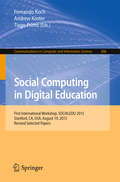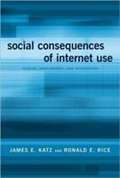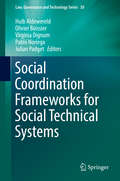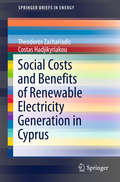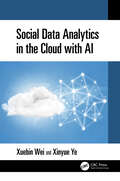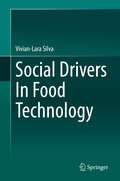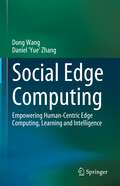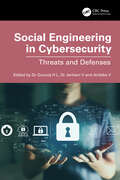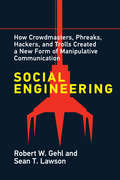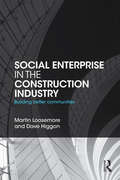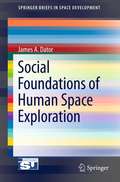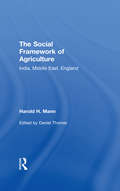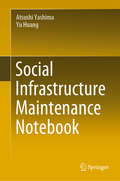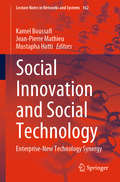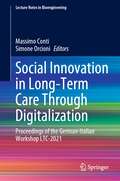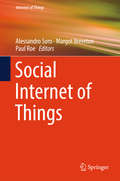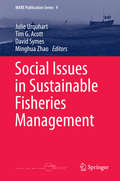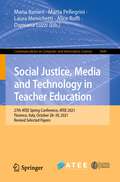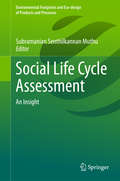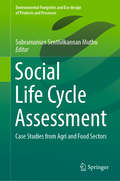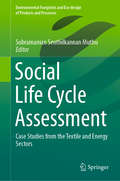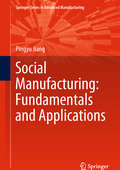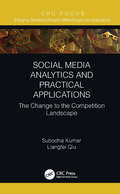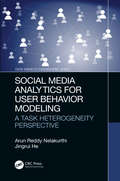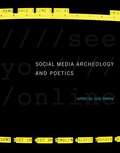- Table View
- List View
Social Computing in Digital Education
by Fernando Koch Andrew Koster Tiago PrimoThis book constitutes the refereed proceedings of the First International Workshop, SOCIALEDU 2015, held in Stanford, CA, USA, in August 2015. The workshop aimed to discuss computational models of social computing applied to Digital Education. The 9 revised full papers presented were carefully reviewed and selected from 12 submissions. The papers address issues such as novel data mining and machine learning for social intelligence in digital education. - Social modelling and simulation to investigate social behaviours, emotional intelligence, influence processes and other social aspects that may influence learning performance in an educational environment. - Smart environments and interactive systems of social computing in digital education. - Analysis of social media and media intelligence in digital education. - Mobile social gaming in digital education. - The utilization of mobile and wearable technology in social systems in digital education, and others.
Social Consequences of Internet Use: Access, Involvement, and Interaction
by James E. Katz Ronald E. RiceAuthors explore the impact of the Internet on society from three perspectives: access to Internet technology, involvement with groups and communities through the Internet, and use of the Internet for social interaction and expression.
Social Coordination Frameworks for Social Technical Systems
by Huib Aldewereld Olivier Boissier Virginia Dignum Pablo Noriega Julian PadgetThis book addresses the question of how to achieve social coordination in Socio-Cognitive Technical Systems (SCTS). SCTS are a class of Socio-Technical Systems that are complex, open, systems where several humans and digital entities interact in order to achieve some collective endeavour. The book approaches the question from the conceptual background of regulated open multiagent systems, with the question being motivated by their design and construction requirements. The book captures the collective effort of eight groups from leading research centres and universities, each of which has developed a conceptual framework for the design of regulated multiagent systems and most have also developed technological artefacts that support the processes from specification to implementation of that type of systems. The first, introductory part of the book describes the challenge of developing frameworks for SCTS and articulates the premises and the main concepts involved in those frameworks. The second part discusses the eight frameworks and contrasts their main components. The final part maps the new field by discussing the types of activities in which SCTS are likely to be used, the features that such uses will exhibit, and the challenges that will drive the evolution of this field.
Social Costs and Benefits of Renewable Electricity Generation in Cyprus
by Theodoros Zachariadis Costas HadjikyriakouThis book presents an economic cost-benefit assessment of the penetration of renewable power generation in Cyprus up to 2030. Unlike a purely financial appraisal, we employ a social cost-benefit analysis that is mainly relevant for policy makers, taking into account - apart from direct financial costs - external costs and benefits from the diffusion of renewable electricity. The book presents a comprehensive yet straightforward case study, probably the first one conducted for Cyprus. Electricity produced by renewable sources increased worldwideat its fastest rate to date in 2014. Driven by policies to mitigate climatechange, enhance energy security and reduce air pollution, and by declining costsof major technologies, renewables account for almost all net new powergenerating capacity in the developed world. In this context, Cyprus isincreasingly adopting renewable power generation as well. In addition to itsenergy and environmental commitments as a member of the European Union, thecountry wishes to diversify its energy supply in order to drive downelectricity costs and reduce energy supply risks. A significant deployment ofrenewable electricity is foreseen in the coming decades. Is it economicallyjustified for a small country with an isolated electric system like Cyprus.
Social Data Analytics in the Cloud with AI
by Xinyue Ye Xuebin WeiThe rise of cloud computing and Generative artificial intelligence (AI) has revolutionized data analytics pipelines. Analysts can collect, store, and process vast datasets in the cloud with high availability and scalability, and also leverage Generative AI to query and visualize datasets in natural languages. This pioneering textbook provides a gateway for students, educators, and professionals to develop and enhance social data analytics capabilities with the latest cloud computing and AI technologies. The textbook introduces educational cloud resources from leading technology companies, begins with foundational concepts, and progresses to advanced techniques.Features The first textbook on cloud-based social data analytics with the assistance of Generative AI. Introduces educational cloud resources from leading technology companies like AWS, GitHub, and MongoDB. Presents a fully AI-powered data analytics pipeline from Python coding to data collection with APIs, cloud-based data storage, natural language queries, and interactive visualization. Analyzes Census and social media data with the latest large language models (LLMs). Provides hands-on exercises with real-world datasets on timely issues. This textbook is an excellent resource for upper-level undergraduate and graduate students taking GIS, Urban Informatics, Social Science Data Analysis, and Data Science courses; faculty members teaching such courses; and professionals and researchers interested in leveraging cloud computing and Generative AI in social data analytics.
Social Drivers In Food Technology
by Vivian-Lara SilvaThis unique and timely text is designed to help food science students learn to perform critical analysis of food processing technology and consider the incorporation of elements that touch on contemporary technological developments in the food sector. As the food industry adjusts to new consumer demands for safe and low processed foods, the time has come to harmonize product and process engineering with ‘relationship engineering’ from farm to fork. This increasingly allows the opportunity for food sector professionals to consider the existence of new drivers of food consumption. These newly discovered drivers are explored in great detail over the course of this book from industrial, economic and human resource viewpoints. Social Drivers In Food Technology presents a series of helpful case studies are presented covering six important food sectors: chocolate, coffee, yogurt, juice, baby food and snacks. These cases have been chosen in order to illustrate dynamic and innovative advances in food processing technology. The information provided over the course of this book has been gained through the thorough study of both scientific literature and organizational reports from food processing companies. The major economic aspects related to food technology are also outlined throughout the text. This multidisciplinary approach is motivated by the opportunity to contextualize the technological debate in strategy and organizational economics, contributing to the formation of human resources. This text is informed by the concept that one must look beyond the technology of the food processing sector and discuss opportunities that involve re-thinking product innovation and process, knowledge generation and human resource training. These innovations have been highlighted in food science & technology literature, but their economic and managerial implications have remained unexplored until now. With its informative case studies, helpful illustrations and quizzes and comprehensive, well-organized scope, Social Drivers In Food Technology is a much-needed textbook that will allow students to look at food processing technology from both industrial and economic perspectives and to consider the important human resource elements involved.
Social Edge Computing: Empowering Human-Centric Edge Computing, Learning and Intelligence
by Dong Wang Daniel 'Yue' ZhangThe rise of the Internet of Things (IoT) and Artificial Intelligence (AI) leads to the emergence of edge computing systems that push the training and deployment of AI models to the edge of networks for reduced bandwidth cost, improved responsiveness, and better privacy protection, allowing for the ubiquitous AI that can happen anywhere and anytime. Motivated by the above trend, this book introduces a new computing paradigm, the Social Edge Computing (SEC), that empowers human-centric edge intelligent applications by revolutionizing the computing, intelligence, and the training of the AI models at the edge. The SEC paradigm introduces a set of critical human-centric challenges such as the rational nature of edge device owners, pronounced heterogeneity of the edge devices, real-time AI at the edge, human and AI interaction, and the privacy of the edge users. The book addresses these challenges by presenting a series of principled models and systems that enable the confluence of the computing capabilities of devices and the domain knowledge of the people, while explicitly addressing the unique concerns and constraints from humans. Compared to existing books in the field of edge computing, the vision of this book is unique: we focus on the social edge computing (SEC), an emerging paradigm at the intersection of edge computing, AI, and social computing. This book discusses the unique vision, challenges and applications in SEC. To our knowledge, keeping humans in the loop of edge intelligence has not been systematically reviewed and studied in an existing book. The SEC vision generalizes the current machine-to-machine interactions in edge computing (e.g., mobile edge computing literature), and machine-to-AI interactions (e.g., edge intelligence literature) into a holistic human-machine-AI ecosystem.
Social Engineering in Cybersecurity: Threats and Defenses
by Dr Gururaj H L Dr Janhavi V Ambika VIn today’s digitally interconnected world, the threat landscape has evolved to include not just sophisticated technical exploits but also the art of human manipulation. Social engineering attacks have emerged as a formidable and often underestimated threat to information security. The primary aim of this textbook is to provide a comprehensive and in-depth exploration of social engineering attacks. The book seeks to equip cybersecurity professionals, IT practitioners, students, and anyone concerned with information security with the knowledge and tools needed to recognize, prevent, and mitigate the risks posed by social engineering. The scope of this textbook is broad and multifaceted. It covers a wide range of social engineering attack vectors, including phishing, vishing, pretexting, baiting, tailgating, impersonation, and more. Each attack vector is dissected, with detailed explanations of how they work, real-world examples, and countermeasures. Key Features • Comprehensive Coverage: Thorough exploration of various social engineering attack vectors, including phishing, vishing, pretexting, baiting, quid pro quo, tailgating, impersonation, and more. • Psychological Insights: In-depth examination of the psychological principles and cognitive biases that underlie social engineering tactics. • Real-World Case Studies: Analysis of real-world examples and high-profile social engineering incidents to illustrate concepts and techniques.• Prevention and Mitigation: Practical guidance on how to recognize, prevent, and mitigate social engineering attacks, including security best practices. • Ethical Considerations: Discussion of ethical dilemmas and legal aspects related to social engineering that emphasizes responsible use of knowledge. This comprehensive textbook on social engineering attacks provides a deep and practical exploration of this increasingly prevalent threat in cybersecurity. It covers a wide array of attack vectors, including phishing, vishing, pretexting, and more, offering readers an in-depth understanding of how these attacks work. The book delves into the psychology behind social engineering and examines the cognitive biases and emotional triggers that make individuals susceptible. Real-world case studies illustrate concepts and techniques while practical guidance equips readers with the knowledge to recognize, prevent, and mitigate social engineering threats.
Social Engineering: How Crowdmasters, Phreaks, Hackers, and Trolls Created a New Form of Manipulativ e Communication
by Robert W. Gehl Sean T. LawsonManipulative communication—from early twentieth-century propaganda to today&’s online con artistry—examined through the lens of social engineering. The United States is awash in manipulated information about everything from election results to the effectiveness of medical treatments. Corporate social media is an especially good channel for manipulative communication, with Facebook a particularly willing vehicle for it. In Social Engineering, Robert Gehl and Sean Lawson show that online misinformation has its roots in earlier techniques: mass social engineering of the early twentieth century and interpersonal hacker social engineering of the 1970s, converging today into what they call &“masspersonal social engineering.&” As Gehl and Lawson trace contemporary manipulative communication back to earlier forms of social engineering, possibilities for amelioration become clearer. The authors show how specific manipulative communication practices are a mixture of information gathering, deception, and truth-indifferent statements, all with the instrumental goal of getting people to take actions the social engineer wants them to. Yet the term &“fake news,&” they claim, reduces everything to a true/false binary that fails to encompass the complexity of manipulative communication or to map onto many of its practices. They pay special attention to concepts and terms used by hacker social engineers, including the hacker concept of &“bullshitting,&” which the authors describe as a truth-indifferent mix of deception, accuracy, and sociability. They conclude with recommendations for how society can undermine masspersonal social engineering and move toward healthier democratic deliberation.
Social Enterprise in the Construction Industry: Building Better Communities
by Martin Loosemore Dave HiggonThrough the emerging lens of social enterprise, this book examines how the global construction industry can engage more effectively with the communities in which it builds, addressing disadvantage and environmental degradation to leave a positive legacy for future generations. Combining insights from leading research and real-life case studies of social enterprise in the construction sector, the result is a practical framework which will help social enterprises, clients, consultants and construction firms work collectively to build a thriving social enterprise sector. Readers of this timely book will learn to embrace social enterprise and an important new sector in the global construction industry. They will learn to see community involvement as an opportunity rather than a risk, and fully understand the broader role they can play in building a fairer and more sustainable society.
Social Foundations of Human Space Exploration
by James A. DatorThis title presents a uniquely human perspective on the quest to explore space and to understand the universe through the lens of the arts, humanities, and social sciences. It considers early stories about the universe in various cultures; recent space fiction; the origins and cultural rationale for the space age; experiences of humans in space and their emerging interactions with robots and artificial intelligence; how humans should treat environments and alien life; and the alternative futures of space exploration and settlement.
Social Framework of Agriculture: India, Middle East, England (Routledge Revivals Ser.)
by Harold H. MannFirst Published in 1968. Dr. Harold H. Mann was during his lifetime an acknowledged authority on applied science and agriculture in England, the Middle East and India, but it is less widely known that he was equally distinguished by his work in the social sciences. He not only pioneered modern-style village surveys in both England and India, but also modern style urban surveys and studies in India. There he broke new ground in his remarkable first-hand research on agricultural labour, village economics, depressed or “Untouchable” classes in town and country, and human and industrial relations in India’s first steel town, Jamshedpur. This book reproduces thirty-five of Dr. Mann’s papers—in whole, in part, or in summary.
Social Infrastructure Maintenance Notebook
by Yu Huang Atsushi YashimaThis book explains in an easy-to-understand manner the “check” points to keep in mind when inspecting various social infrastructure structures. It is put together in a way that not only engineers who are on the front line of maintenance and management but also engineers who are not normally involved in maintenance and management of social infrastructures as well as general public can understand the importance of social infrastructure inspection work.
Social Innovation and Social Technology: Enterprise-New Technology Synergy (Lecture Notes in Networks and Systems #162)
by Mustapha Hatti Kamel Boussafi Jean-Pierre MathieuThis proceedings book is of interest to all researchers and heads of technology laboratories; incubator managers; local and parliamentary elected officials; associations and civil society; social entrepreneurs; foundations interested in social life in Mediterranean region and prospective creative startup students. The purpose of book on social and social-tech innovation synergy and its practical implication on social entrepreneurship is to address the following question: - How can the experiences of the countries be combined of the north and south shores of the Mediterranean and reflect on the different opportunities offered by the new technology to cope with the various social scourges that the region has experienced in recent years? the problem of immigration. It is also about finding advanced technology applications that will solve, on a large scale, the major social challenges of our time. - How to exploit the innumerable synergies between digital and social entrepreneurship? - Why social entrepreneurs are struggling to seize digital tools to develop their socially innovative projects? - What about their ability to integrate digital into the realization and development of these projects? - How can we combine the experiences of the countries of the north and south shores of the Mediterranean and reflect on the different opportunities offered by the new technology to cope with the various social scourges that the region has experienced in recent years? the problem of immigration.
Social Innovation in Long-Term Care Through Digitalization: Proceedings of the German-Italian Workshop LTC-2021 (Lecture Notes in Bioengineering)
by Simone Orcioni Massimo ContiThis book gathers extended contributions to the workshop on Long-Term Digital Care, LTC-2021, organized by the Università Politecnica delle Marche (UNIVPM), Ancona, Italy, and the Hochschule Konstanz (HTWG), Germany, in November 2021, and funded by the DAAD Joint Mobility Program. It covers innovative, practice-oriented approaches that are expected to foster digital health care, with a special focus on improving internationalization and accessibility. The book, which bridges between technological and social disciplines, reports on selected studies with the main goals of: establishing a comparison of Long-Term Digital Care approaches, with focus on exchange and networking processes; defining practical roadmaps for digital social innovation; establishing concepts and methods for process evaluation and sustainability. It offers a timely snapshot on technologies for patient monitoring and assistant systems, medical data analysis and image processing, digital platforms and advanced diagnostics techniques, and discusses important concepts relating to traceable process evaluation, networking and accessibility. It aims at informing, yet it is also intended to inspire and foster a stronger collaboration across disciplines, countries, as well as academic and professional institutions.
Social Internet of Things (Internet of Things)
by Alessandro Soro Margot Brereton Paul RoeThe aim of this book is to stimulate research on the topic of the Social Internet of Things, and explore how Internet of Things architectures, tools, and services can be conceptualized and developed so as to reveal, amplify and inspire the capacities of people, including the socialization or collaborations that happen through or around smart objects and smart environments. From new ways of negotiating privacy, to the consequences of increased automation, the Internet of Things poses new challenges and opens up new questions that often go beyond the technology itself, and rather focus on how the technology will become embedded in our future communities, families, practices, and environment, and how these will change in turn.
Social Issues in Sustainable Fisheries Management
by Julie Urquhart Tim G. Acott David Symes Minghua ZhaoThis volume is an interdisciplinary mix of perspectives and studies on social issues in fisheries from a diverse range of case studies and research disciplines. The case is made regarding the dearth of attention to socio-cultural considerations which to date have been largely treated as an externality of fisheries policy. It will be valuable to researchers and decision makers interested in understanding the social dimension of fisheries and provides a timely and relevant compilation of research and analysis on some of the critical socio-cultural issues facing fisheries management and fishing communities today.
Social Justice, Media and Technology in Teacher Education: 27th ATEE Spring Conference, ATEE 2021, Florence, Italy, October 28–29, 2021, Revised Selected Papers (Communications in Computer and Information Science #1649)
by Maria Ranieri Marta Pellegrini Laura Menichetti Alice Roffi Damiana LuzziThis book constitutes the refereed proceedings of the 27th ATEE Spring Conference onSocial Justice, Media and Technology, ATEE 2021, held in Florence, Italy, during October 28–30, 2021.The 19 full papers included in this book were carefully reviewed and selected from 49 submissions. They were organized in topical sections as follows: teaching critical media/digital literacy in multicultural societies; decommodifying teacher (digital) education; and digital technology and equity for inclusive teaching.
Social Life Cycle Assessment
by Subramanian Senthilkannan MuthuThis book details the primary concepts of Social Life Cycle Assessment (S-LCA), integration of social aspects in product life cycles, quantification of social impacts in S-LCA, impact categorization in S-LCA, methodological aspects of S-LCA, and detailed case studies. As the societal implications of producing a product are coming to take on a new importance, the concept of Social Life Cycle Assessment has recently been developed and is becoming increasingly prominent. However, S-LCA is still in its infancy and its impact categories for many industrial segments are still under development.
Social Life Cycle Assessment: Case Studies from Agri and Food Sectors (Environmental Footprints and Eco-design of Products and Processes)
by Subramanian Senthilkannan MuthuThis book highlights the Social Life Cycle Assessment (SLCA) of the agri-sector for rice, sugarcane, and cassava in Thailand and the food sector. It also presents a range of models, indices, impact categories, etc. for SLCA that are currently being developed for industrial applications. Though SLCA was introduced in 2010, it is still relatively new compared to environmental life cycle assessment (ELCA).
Social Life Cycle Assessment: Case Studies from the Textile and Energy Sectors (Environmental Footprints and Eco-design of Products and Processes)
by Subramanian Senthilkannan MuthuThis book highlights the Social Life Cycle Assessment (SLCA) of the energy and textile sectors. It also presents a range of models, indices, impact categories, etc. for SLCA that are currently being developed for industrial applications. Though SLCA was introduced in 2010, it is still relatively new compared to environmental life cycle assessment (ELCA).
Social Manufacturing: Fundamentals and Applications (Springer Series in Advanced Manufacturing)
by Pingyu JiangThis book introduces social manufacturing, the next generation manufacturing paradigm that covers product life cycle activities that deal with Internet-based organizational and interactive mechanisms under the context of socio-technical systems in the fields of industrial and production engineering. Like its subject, the book's approach is multi-disciplinary, including manufacturing systems, operations management, computational social sciences and information systems applications. It reports on the latest research findings regarding the social manufacturing paradigm, the architecture, configuration and execution of social manufacturing systems and more. Further, it describes the individual technologies enabled by social manufacturing for each topic, supported by case studies. The technologies discussed include manufacturing resource minimalization and their socialized reorganizations, blockchain models in cybersecurity, computing and decision-making, social business relationships and organizational networks, open product design, social sensors and extended cyber-physical systems, and social factory and inter-connections. This book helps engineers and managers in industry to practice social manufacturing, as well as offering a systematic reference resource for researchers in manufacturing. Students also benefit from the detailed discussions of the latest research and technologies that will have been put into practice by the time they graduate.
Social Media Analytics and Practical Applications: The Change to the Competition Landscape (Emerging Operations Research Methodologies and Applications)
by Subodha Kumar Liangfei QiuSocial Media Analytics and Practical Applications: The Change to the Competition Landscape provides a framework that allows you to understand and analyze the impact of social media in various industries. It illustrates how social media analytics can help firms build transformational strategies and cope with the challenges of social media technology. By focusing on the relationship between social media and other technology models, such as wisdom of crowds, healthcare, fintech and blockchain, machine learning methods, and 5G, this book is able to provide applications used to understand and analyze the impact of social media. Various industries are called out and illustrate how social media analytics can help firms build transformational strategies and at the same time cope with the challenges that are part of the landscape. The book discusses how social media is a driving force in shaping consumer behavior and spurring innovations by embracing and directly engaging with consumers on social media platforms. By closely reflecting on emerging practices, the book shows how to take advantage of recent advancements and how business operations are being revolutionized. Social Media Analytics and Practical Applications is written for academicians and professionals involved in social media and social media analytics.
Social Media Analytics for User Behavior Modeling: A Task Heterogeneity Perspective (Data-Enabled Engineering)
by Arun Reddy Nelakurthi Jingrui HeWinner of the "Outstanding Academic Title" recognition by Choice for the 2020 OAT Awards. The Choice OAT Award represents the highest caliber of scholarly titles that have been reviewed by Choice and conveys the extraordinary recognition of the academic community. In recent years social media has gained significant popularity and has become an essential medium of communication. Such user-generated content provides an excellent scenario for applying the metaphor of mining any information. Transfer learning is a research problem in machine learning that focuses on leveraging the knowledge gained while solving one problem and applying it to a different, but related problem. Features: Offers novel frameworks to study user behavior and for addressing and explaining task heterogeneity Presents a detailed study of existing research Provides convergence and complexity analysis of the frameworks Includes algorithms to implement the proposed research work Covers extensive empirical analysis Social Media Analytics for User Behavior Modeling: A Task Heterogeneity Perspective is a guide to user behavior modeling in heterogeneous settings and is of great use to the machine learning community.
Social Media Archeology and Poetics
by Judy MalloyFocusing on early social media in the arts and humanities and on the core role of creative computer scientists, artists, and scholars in shaping the pre-Web social media landscape, Social Media Archeology and Poetics documents social media lineage, beginning in the 1970s with collaborative ARPANET research, Community Memory, PLATO, Minitel, and ARTEX and continuing into the 1980s and beyond with the Electronic Café, Art Com Electronic Network, Arts Wire, The THING, and many more.With first person accounts from pioneers in the field, as well as papers by artists, scholars, and curators, Social Media Archeology and Poetics documents how these platforms were vital components of early social networking and important in the development of new media and electronic literature. It describes platforms that allowed artists and musicians to share and publish their work, community networking diversity, and the creation of footholds for the arts and humanities online. Anditinvites comparisons of social media in the past and present, asking: What can we learn from early social media that will inspire us to envision a greater cultural presence on contemporary social media?ContributorsMadeline Gonzalez Allen, James Blustein, Hank Bull, Annick Bureaud, J. R. Carpenter, Paul E. Ceruzzi, Anna Couey, Amanda McDonald Crowley, Steve Dietz, Judith Donath, Steven Durland, Lee Felsenstein, Susanne Gerber, Ann-Barbara Graff, Dene Grigar, Stacy Horn, Antoinette LaFarge, Deena Larsen, Gary O. Larson, Alan Liu, Geert Lovink, Richard Lowenberg, Judy Malloy, Scott McPhee, Julianne Nyhan, Howard Rheingold, Randy Ross, Wolfgang Staehle, Fred Truck, Rob Wittig, David R. Woolley
